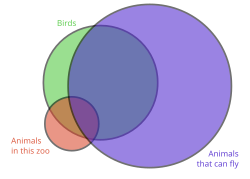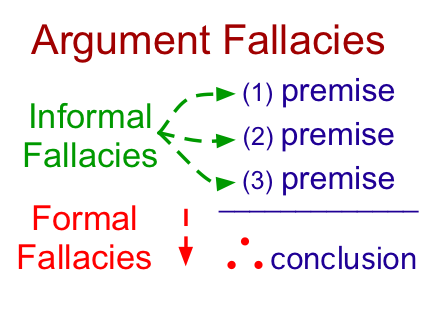Logical Fallacies
1/7
Earn XP
Description and Tags
Logical Fallacies are failure in reasoning which renders an argument invalid.
Name | Mastery | Learn | Test | Matching | Spaced |
|---|
No study sessions yet.
8 Terms
Logical Fallacy, Formal Fallacy, Deductive Fallacy, and non sequitur (Latin for 'it does not follow)
A failure in the individual reasoning which renders an argument invalid. Formal Fallacies are in the relationship between the premises and conclusion. The premise’s themselves may be true, however the conclusion following the logic of the premises does not follow.
It is a pattern of reasoning in which the conclusion may not be true even if all the premises are true.
It is a pattern of reasoning in which the premises do not entail the conclusion.
It is a pattern of reasoning that is invalid.
It is a fallacy in which deduction goes wrong, and is no longer a logical process.
Image:
1. Most animals in this zoo are birds.
Most birds can fly.
Therefore, most animals in this zoo can fly.

Informal Fallacy
A type of fallacy which occurs when the argument is invalid due to the context or the content presented in the argument. Logical fallacies can be fine in structure in which case the premises do follow, however its context or content is wrong, making the entire argument invalid. The error is in what is being said, not what it itself is.
Example: “You have two choices, either you support raising the taxes, or support lowering them.” This is a false dichotomy, the two choices themselves are fine, but what is presented is false. There is a third option, to support keeping the taxes as is.

Fallacy of Irrelevance
A category of Informal Fallacies which fail to address the point of the arguer by speaking on unrelated issues. This is not to be confused with a Formal Fallacy, in which the conclusion does not follow from the premises. The Fallacy of Irrelevance is the defense failing to properly address the point of the other side.
Fallacy of Equivocation
When the arguer uses a single word in two unrelated definitions, with those two definitions not having any sense of intended different meaning within a sentence. This is different from using a word in its dictionary definition. It is when a single word is used ambiguously in a way to attempt to mislead the user. And is used in such a way to lead to a false conclusion. It is an Informal Fallacy.
Example: “Since only man [human] is rational. And no woman is a man [male]. Therefore, no woman is rational.”
As seen with informal fallacies, the structure is fine.
P1: Only humans are rational
P2: No woman is a man
These two on their own are true, but the way that they are presented is deceitful, leading to a false conclusion.
Composition Fallacy
An Informal Fallacy in which one assumes that which is true of a part is necessarily true for the whole. Without considering whether the property does apply to the whole.
Example: “An individual brick of a wall is light, a wall is made of bricks, therefore the entire brick wall is light.”
The deductive structure of the argument is sound, but it is false due to a hidden unwarranted premise.
P1: An individual brick of a wall is light
P2: The wall is made of bricks
(Implied) P3: That which is true for a part is also true for the whole.
Conclusion: Therefore, the wall is light
Neither of the premises is necessarily false, but the reasoning is false; the arguer omits his assumptions, one of them being that what applies to the small MUST also apply to the whole. If this assumption is taken as warranted, the conclusion follows, but the assumption is false. The qualities of the parts do not necessarily apply to the whole. Therefore, the argument fails due to its omission of vital context, making it an informal fallacy.

Strawman Fallacy
A strawman fallacy is a Informal Fallacy in which another party misrepresents, exaggerates, or fabricates the argument of the defender in order to make it easier to object to.
Example:
Party A and Party B are debating,
Party A says “I love cats.”
Party B misrepresents Party A’s argument and states “Party A hates dogs”
This is a informal fallacy because the context of the argument is misrepresented, it is not that what Party A said that is fallacious, it is that the context that Party B stated in his argument which is fallacious.
Genetic Fallacy
An Informal Fallacy, in which the opposing side dismisses the point of the arguer ONLY by the source of the argument. The fallacy misses the point of the argument because it shifts on an unrelated issue (source). While we may look at the credibility of a claim by it’s source, one cannot simply outright decline a claim with 100% certainty simply because of the source.
Example:
Party A: “Cancer is bad!”
Party B: “We should all dismiss A’s claim simply because Part A has a large track record of lying.”
This is a Informal Fallacy because it in no way addresses the point of the arguer, and rather changes the argument via its context.
Motte and Bailey fallacy
A informal fallacy in which the arguer has two positions, one more reasonable ‘motte’ (a defensible claim) and the other more controversial ‘bailey’ (a controversial). When the controversial position is challenged the arguer returns back to the reasonable position.
Example:
Party A: “Science has disproven the existence of God” (Bailey)
Party B: “In what way?”
Party A: “Well… what I really mean by that is that science hasn’t proved the ‘existence’ of God.” (Motte)